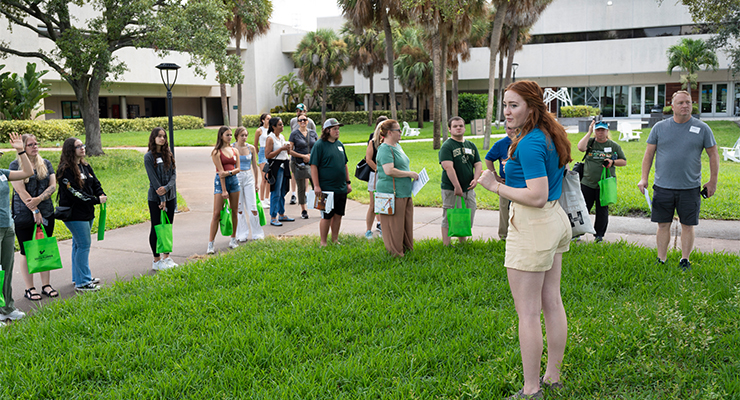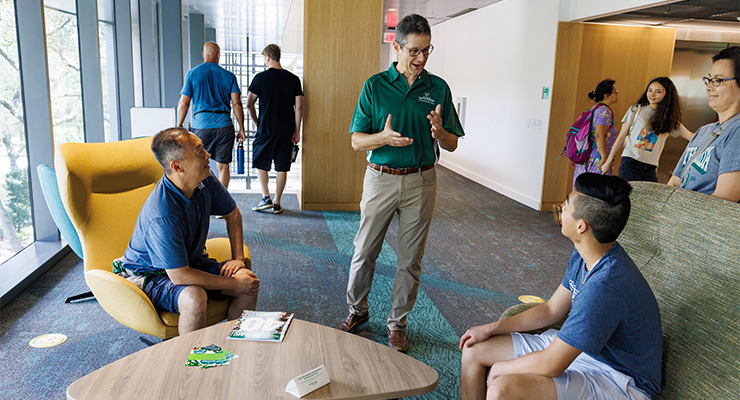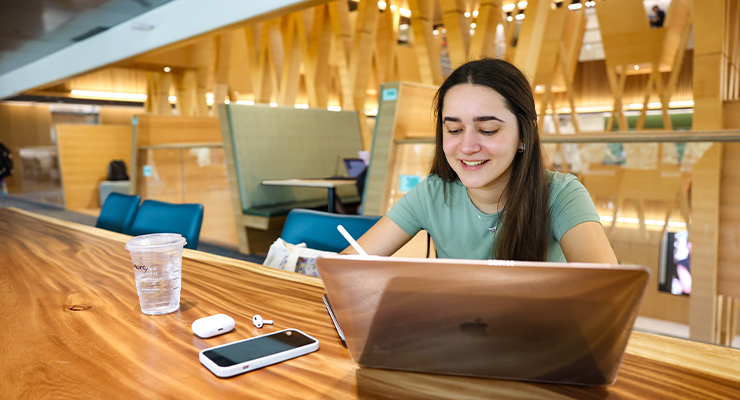How Campus Visits and Tours Can Affect Your College Decision
By Emily Young | Last Updated: Mar 5, 2025

You’ve consulted everything. A guidance counselor. A tarot deck. A magic eight ball. A pro-con list so thorough, Rory Gilmore could’ve made it. But you still feel paralyzed by looming college decisions. Where should you apply? And — if you’ve already been accepted — which school should you attend?
Forget the magic eight ball. It’s time for a campus tour.
“Touring a college campus is really the best way to get a sense of whether or not you can see yourself at that campus,” says Freddie O'Brion, coordinator for campus visitation at USF. Sure, you can find plenty of helpful data on a school’s website. But when you step onto campus, you can feel vibes. Plus, you can talk to students, admissions officers, and even faculty — giving you a behind-the-scenes peak at life on campus.
Let’s dive into how a campus tour can help you in the college decision making process.
Wait! I Can’t Do an In-Person College Campus Tour!
An in-person campus visit isn’t going to be feasible for everyone, due to health or financial circumstances. “We know there is a barrier to coming and visiting a (school),” explains Brandon Cheatham, assistant director for campus visitation experience at USF Tampa. “We want people to have access no matter what.”
That’s why many schools, including USF, have created immersive virtual tours. Some virtual tours are even more in depth than an in-person visit, explains this article from U.S. News & World Report: “A general in-person tour might not include a visit to the student newspaper building, but an aspiring journalism major may be able to tour it online.”
USF offers virtual tours of all three campuses that feature 360° panoramic photos and recorded audio from current tour guides. (“I personally sometimes will go on the virtual tour and just click around because it’s so much fun,” says O'Brion.)
How to Prepare for Your College Campus Tour
If you know which schools you’re visiting, make the most of your tour by planning ahead of time.
- Research the school. That way, you’ll already know general information and can focus your tour — and questions — on what’s most important to you.
- Register in advance. Not only does this save your spot, the registration process can also help tour guides get to know you. Some registration forms might ask about your areas of interest, potential career paths, and extracurriculars you enjoy, so your guide can point out relevant info on your tour.
- Plan to visit the campus during a weekday so you can see what it’s like when classes are in session.
- Make the most of your trip by checking out all prospective schools in an area. And if your prospective school has multiple campuses — as USF does — visit each of them. You never know where you’ll click! (Just make sure you don’t try to cram in too many tours in one day. You want to have time to soak up the vibes and reflect after each campus tour.)
- Dress for comfort. Think walking shoes, removable layers, and sunscreen.
- Have your phone handy to take notes, photos, and videos.
Although planning ahead is great, don’t sweat it if your tour is more spontaneous. “My tour was a little more impromptu,” says Aidan Cawley, a third-year environmental sciences major and tour guide at USF St. Petersburg. On a group tour of Florida state schools, Cawley and his peers had “several hours to kill” while they waited for traffic to die down. They ended up at USF St. Petersburg — where Cawley fell in love with the campus.
How Your Campus Visit Experience Can Help You Make a Decision
When Cawley talks to campus visitors, they usually don’t have a straightforward answer about why they are drawn to certain campuses. It’s more of a gut check: Do they feel at home? Is the campus the right size? Ultimately, this is the benefit of a campus visit: There’s no right or wrong answer about whether it’s the right fit. Only you can tell that. “Visiting a college in person can help you to form your own impressions rather than relying on what somebody else has to say about the campus,” explains this article by CollegeRaptor.
Here’s how you can make the most of this opportunity:
Assess the Vibe
As you tour, check in with yourself:
- How long does it take you to walk around campus? Do you wish it was bigger? Smaller?
- Do the buildings and landscaping inspire you?
- Is the campus laid-back or bustling with activity?
- How do you feel about the surrounding area?
One university can have several campuses with different “personalities.” At USF, you can choose from three campuses to find your best fit:
- The large Tampa campus is a bustling, urban environment where you’ll find nearly endless events and activities.
- The midsize, waterfront St. Petersburg campus is nestled between the culturally rich downtown and the water of Bayboro Harbor.
- The intimate Sarasota-Manatee campus is known for its tight-knit community and hometown feel.
Do Some Sightseeing
When you decide on a school, you’re also choosing where you’ll live for the next four years — and maybe longer, if you land a postgrad job in the area. Set aside some time to explore the business and cultural districts around your prospective school, and be sure to check out the local recreation. In Tampa Bay, you can explore:
- World-class art at The Salvador Dali Art Museum, the Ringling Museum, the Tampa Museum of Art, and more. Plus, catch a Broadway show at the Straz Center for the Performing Arts.
- Major league sports games, thanks to the Bucs, Lightning, Rays, and Rowdies.
- Sugar-sand beaches ranked among the best in the U.S. — all in USF’s backyard.
- Theme parks like Busch Gardens (which is close to the Tampa campus) or Walt Disney World (just a day trip away).
- Local culture, whether it’s Tampa’s historic Ybor City, an art show in Sarasota, or the Saturday Morning Market in St. Petersburg. (“I actually just went to the Saturday Morning Market and got some cheese,” O’Brien says. “A raspberry stout asiago, which was amazing.”)
Along with your sightseeing, try to get a taste for everyday life. Hop on the public transportation (especially if you don’t plan on bringing a car to campus), shop at the local grocery store or pharmacy, and scout out the nearest hospital. Can you see yourself living here?
Ask Questions
Never hesitate to ask questions during your tour. For one thing, campus tour guides love getting questions — “That’s their favorite part of the job,” O’Brien says. And when you ask questions, you give the other members of your tour group the confidence to speak up, too.
But what kinds of questions should you ask? “The most common questions are like, how does the roommate process work, or what does safety look like on campus?” O’Brien says. While these general questions are important, O’Brien says you can get many of them answered through the website. “I feel like the best questions are things that'll give you specific answers about information that's relevant to you.”
Cawley agrees. This is your opportunity to ask your tour guide about their personal experiences — particularly with professors, jobs, and campus involvement. (“Take it from a guy who has… what are we up to?” Cawley says, mentally calculating his resume. “Four campus jobs, two clubs, USF ambassadors, and some loose affiliations with other departments like student government and campus rec. I personally love being involved on campus.”)
Try asking these questions on your next college campus tour:
- Can you tell me about your experience with the professors on campus?
- Are there any professors you would recommend?
- What jobs and internship opportunities are available for [your academic program of interest]?
- Where do you recommend that students look for work on campus?
- What’s your favorite on-campus job?
- What do you typically do on the weekends?
- What campus life are you involved in?
Don’t forget the power of follow-up questions, too. For example, if your tour guide mentions they are part of a living learning community — like the one that raises guide dogs at the USF St. Petersburg campus — feel free to dig deeper: Can you tell me more about that?
Choose all the Extras
After your campus tour, spend some time in the places you’d frequent as a student. Have a meal in the dining hall. Take notes on your tour in a study nook. And sign up for the “extra” offerings that immerse you in the school’s academic culture:
- Make an appointment to sit in on a class. “If there is a particular class that you would love to sit in on, but it’s not on the list of admissions office-approved classes, contact the professor and respectfully ask if it would be okay for you to be a fly on the wall in their class,” suggests this IvyWise article.
- Ask to tour a department or organization that interests you.
- Talk to an admissions counselor. Although USF’s guided tours include presentations with admissions counselors, you can also make an appointment or drop in for a one-on-one session.
Listen to Yourself
Now that you’ve toured potential schools, you’ll probably feel more empowered to make a decision. But that doesn’t mean the decision will be easy. Take time and listen to yourself. Cheatham advises students to think about what they really want, and ask yourself: “Can I see myself achieving those things at this place?”
If you’re sorting through a ton of potential schools, O’Brien recommends making a spreadsheet: list all the schools you’re considering and write your notes in different columns for financial aid, location, academic program offerings, extracurriculars, etc. Now compare. Which school checks the most boxes?
Remember that you don’t have to make this decision alone. School admissions offices and tour guides are happy to answer follow-up questions and assist in any way they can. Contact the USF Office of Admissions online and find out how we can help. Or schedule your tour of USF today!


